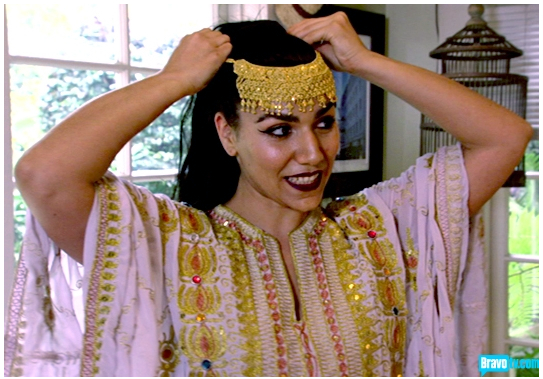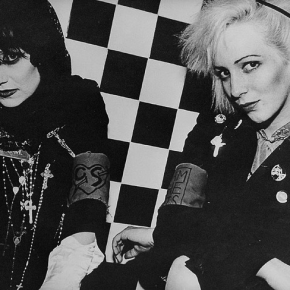We Iranians have a lot on our plates these days: the looming shadow of war, crippling international sanctions that are starving our economy and making life miserable, a despotic theocratic regime that controls every aspect of our lives. And, to add insult to injury, American reality shows that ridicule our culture and make us look like idiots.
For weeks, we waited with bated breath for Ryan Seacrest’s latest magnum opus, Shahs of Sunset, a reality TV show centered on the Iranian community in California. Not just any Iranians, but the mansion-dwelling, martini-drinking, 90210 ilk living the high life in the upper-crust neighborhoods of Beverly Hills.
There’s six of them: Reza, the moustache-wielding Hollywood-gay poster boy; Gigi, the spoiled Daddy’s-little-darling; Mike, the Jewish-Persian Casanova wannabe; MJ, the drama queen with the out-of-control liquor intake; Asa, the declared intellectual of the bunch and Sammy, who is irrelevant. Period.
The show, which premiered on Bravo in March, instantly ruffled feathers among Iranian-Americans, who were quick to criticize it for distorting their image by selecting a group of snotty, self-absorbed and blithely ignorant individuals to represent them in the eyes of millions around the world. “In reality, the Iranian-American community has been anything but, with Iranian-Americans playing major roles in American corporations such as eBay, Google, Expedia, AT&T, and Yahoo,” writes Roshanak Taghavi in the Christian Science Monitor.
As for those of us born and bred in Iran, we weren’t quite sure what to make of the show after its premiere. For us, reality shows are unfamiliar territory. The closest we’ve had to them are TV broadcasts of home videos of Ayatollah Khomeini (the founder of the Islamic Revolution) sipping tea, walking around his garden, sipping some more tea and finally drawing his last breath on a hospital bed in Tehran. We couldn’t wrap our heads around reality programming, and its growing popularity in America. How could something so fake be considered reality? But with the rise of satellite television and the Internet in Iran, reality TV is beginning to enjoy a new fan base among young Iranians.
After the debacle that was its first episode, some Iranians condemned it as American propaganda seeking to tarnish their beloved culture, while others decided to give it the benefit of a doubt. Milad Minooie, an Iranian commentator for college newspaper The Shorthorn, plays down the kerfuffle over the show. “I laugh along,” he says. “After decades of portraying us as terrorists and extremists in the U.S. and Europe, here comes a show that depicts us as liking to party and knowing how to have a good time. What’s wrong with that?”
Sadra Shahab, an Iranian activist based in New York, takes a similar line. According to Shahab, the Shahs of Sunset is absolute nonsense. It’s just a reality show. People know not to take it seriously. “Seacrest probably took a stroll around Beverly Hills, met a few rich Iranians living there, and thought ‘hey, wouldn’t it be great to make a show out of their lives?’”
“Compared to recent films like the Stoning of Soraya M, this is quite harmless,” said Shahab, referring to the 2009 film by Cyrus Nowrasteh, which told, with graphic detail, the true story about an innocent woman’s public execution in a rural Iranian village.
They both have a point. Following the 1979 Islamic Revolution and the seizure of the American embassy in Tehran, Iranians have been by and large reduced to the bête noir of pop culture thanks to Hollywood and a torrent wave of propaganda productions such as Not Without My Daughter (1990) and more recently, Alexander (2004) and 300 (2006), both of which drew the ire of Iranians for demonizing their historical image.
Compared to those, the image of Iranians in Shahs of Sunset is innocuous at best. But before we jump with joy and tip our hats to Ryan Seacrest for opting to show us as party animals rather than wife-beaters, lets take a moment to think of the program’s ramifications that cannot and should not be overlooked.
In the vein of every reality show, the Shahs of Sunset puts Iranians and their culture in a box. With its cast of overtly-sexualized characters and their extravagant daily escapades, the so-called ‘reality’ show takes media-induced Orientalism to a whole new level. It ends up being an insidious disinformation campaign, which rather than helping the Americans better understand the Iranian community, reinforces stereotypes that obscure them even more.
In keeping, the Shahs of Sunset alienates American-Iranians from native Iranians. As an Iranian who only recently moved to the United States, I have always felt a kinship with Iranians in the Diaspora. For me, we were all Iranian, no matter where in the world we live or whether we carry hyphenated nationalities. I believe that regardless of our religion and ethnic backgrounds, we all share the same myths, symbols, memories, customs, traditions, rituals, and values, etc. In the wake of the 2009 presidential elections in Iran and the government’s violent crackdown on opposition protestors, it was a great source of inspiration to see Iranians in the Diaspora, some of whom had never even visited Iran, hold parallel demonstrations in solidarity with us, and in support of our cause. Even today, as the drum beats louder for a military option on Iran, scores of Iranians are taking a stand against war and sanctions, whether on the streets of New York, or on social media sites such as Facebook.
Sadly, shows such as Shahs of Sunset, in which characters emphasize that they are Persian and not Iranian, fracture and fragment us as a community even more. In one scene, MJ’s mother pokes fun at her daughter’s dress by claiming “she looks like a village girl from the Iranian city of Qom.” This isn’t funny. In addition to being highly offensive, it reinforces the imperialistic view that Iranian people, and by extension all people without the luxury of an American upbringing, are primitive and provincial.
“It rapes our image just for the sake of entertainment and a few laughs,” says Al Nazemian, an Iranian actor and producer in New York. “Seacrest has no scruples about the irreparable damage it does. All he cares is for it to sell and bring money.”
Screenshot courtesy of Shahs of Sunset






The American media caters to its public’s need, and new cultures are only introduced by finding the common ground with the American culture; in this case consumerism, partying and sex. The American mass (yes I’m generalizing) need to stay in their comfort zone, and showing them something that contradicts the stereotypes they hold could be dangerous. But is this a product of the media or is the media just listening to what the public wants? It really is a question of what came first, the chicken or the egg?
Despotic regime? I think that is a not a correct statement, with a population of close to 80 million, I do not think its fair to generalize an entire population based on tenuous facts. I think you should consider a different perspective. Iran’s greatest asset today, is the democratic aspects of its government, aspects which are imbued with an ethos which is anathema to the autocratic and hereditary Arab despots which are trying to fend off the rising democratic aspirations of its own peoples. To the extent Iran continues to develop as the champion of democracy in the Persian Gulf region, it will become invincible and a beacon to be emulated throughout the region.